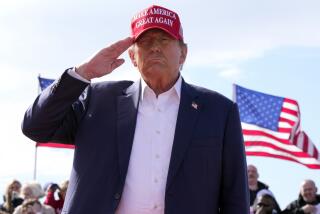Clinton Asks Unity, New Tools to Fight Terrorism
- Share via
WASHINGTON — President Clinton called on Republican leaders Monday to help wage a “long, disciplined, concerted, united effort” to combat terrorism by giving the government more tools to confront it.
“I think when the bomb went off in the Centennial Olympic Park in Atlanta, that park literally became our national common ground--a symbol of our common determination to stand against terrorism,” Clinton said at the start of a bipartisan White House meeting on terrorism.
The president and a delegation of Republican and Democratic leaders from Congress agreed to discuss several measures to combat terrorism, including the use of anti-racketeering laws, lengthier statutes of limitation on firearms and bombing offenses, expanded emergency wiretap authority and other proposals.
“This unites all Americans in their commitment to make this country safe and to protect innocent people,” said House Speaker Newt Gingrich (R-Ga.) shortly before the White House meeting. Gingrich’s home state is hosting the Olympics, where a pipe bomb Saturday was responsible for two deaths and the wounding of 111 people. Authorities suspect a bomb might have caused the crash less than two weeks ago of a Trans World Airlines jumbo jet off Long Island, N.Y., killing all 230 people aboard.
Yet despite the aura of bipartisan unity, there was continuing opposition on Capitol Hill to some of the ideas, notably a proposed requirement of traceable markers called “taggants” in ingredients usable for explosives.
Democrats highlighted the GOP’s past opposition to some of Clinton’s anti-terrorism initiatives. “It may put them in an awkward position,” said Senate Minority Leader Tom Daschle (D-S.D.).
The National Rifle Assn. and others have opposed the use of taggants as unsafe, although law enforcement authorities have argued that they would be useful in cases such as the Atlanta bombing. A requirement for such markers was dropped from an anti-terrorism bill earlier this year.
The White House on Monday proposed spending $25 million for a study of the subject and specified that black powder, reportedly used in the Atlanta bombing, should be covered by such a requirement.
Republicans “have to decide between the NRA and the FBI,” Daschle said. “I would hope they choose the FBI.”
In addition, the White House has requested expanded police wiretap authority that would enable law enforcement agents to monitor all communications devices used by suspected terrorists, such as cellular phones and pagers. Currently, police can be given authority to monitor a specific phone number but not a specific person.
But the wiretapping proposal faces opposition from a powerful left-right coalition of civil-liberties advocates and conservatives who share a reluctance to give more power to the government. The American Civil Liberties Union helped lead the charge against the wiretapping proposal last year and continues to oppose any effort to expand wiretapping power.
“We don’t want to see any expansion of federal law enforcement wiretaps because the wiretaps already intercept so many innocent conversations,” said Gregory Nojeim, legislative counsel for the ACLU.
He argued that the recent acts of suspected terrorism should not fuel additional interest in expanded wiretap powers because they are seldom used in cases involving terrorism. He cited estimates that, over the last 10 years, only 0.2% of all wiretap orders were for cases involving arson, bombings or firearms.
Administration officials also asked Congress to approve several other anti-terrorist provisions. These include broader authority for law enforcement agents to monitor the telephone, travel and hotel records of foreign nationals suspected of terrorism and lengthening the statutes of limitation for firearm and bombing offenses to five years from three.
One area where Republican and Democratic leaders hinted at agreement Monday was in providing additional funding for the FBI, whose resources were strained severely by investigative demands even before the Atlanta bombing.
“First, the FBI needs more tools,” Daschle said. “Secondly, they need more resources, and we need to find a way to provide both as quickly as possible.”
Rep. Charles E. Schumer (D-N.Y.) said that he would begin the drive to push the administration-backed anti-terrorism measures today by offering the taggant requirement, wiretapping expansion and other proposals as amendments to a juvenile crime bill being debated in the House Judiciary Committee.
“We will not win the war on terrorism by bowing to every whim or demand of the National Rifle Assn.,” Schumer said.
The controversy comes at a time when the GOP alliance with the NRA has been under high-level strain. Republican presidential contender Bob Dole recently infuriated the gun lobby when he backed away from his past promises to lead the fight for a top NRA priority--repeal of the 1994 assault weapons ban.
Republican leaders said that they would appoint a bipartisan House-Senate task force to meet with White House Chief of Staff Leon E. Panetta and other administration officials beginning today to see what actions Congress could take quickly--perhaps as soon as this week.
“This is something all Americans have been traumatized by,” Senate Majority Leader Trent Lott (R-Miss.) said.
While wanting to be responsive to White House demands for quick action, Republicans warned against too hasty a response. “We shouldn’t rush to prejudgment,” Gingrich said. “As much as we want to get the terrorists, we want to do it in a methodical way that preserves our freedoms.”
* L.A. BOMB SCARE: Atlanta pipe bomb has a ripple effect in Los Angeles. B1
More to Read
Sign up for Essential California
The most important California stories and recommendations in your inbox every morning.
You may occasionally receive promotional content from the Los Angeles Times.














